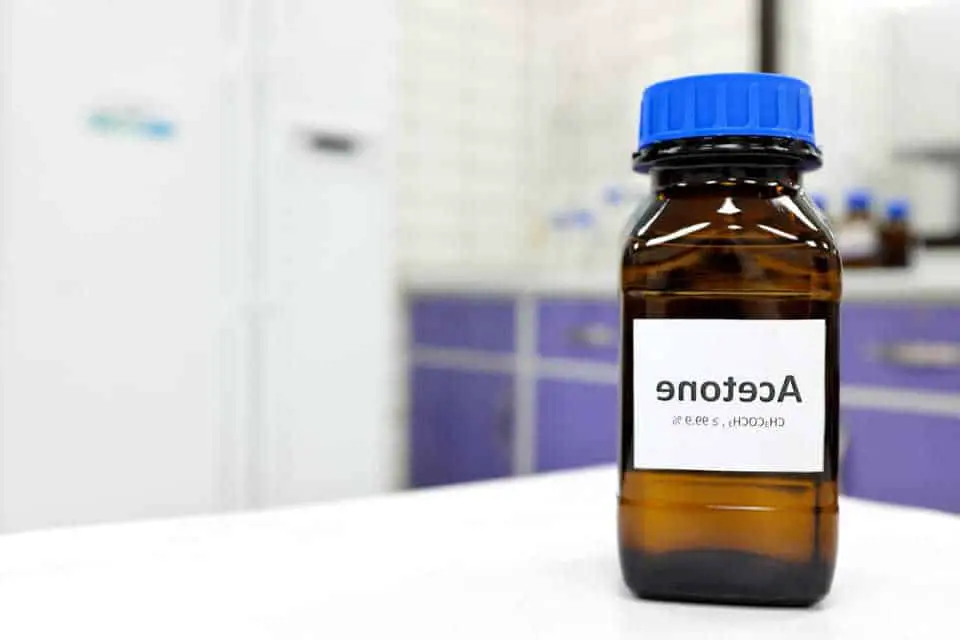Have you ever found yourself staring at a stubborn stain on your vinyl flooring, wondering if a little acetone might be the magic solution? While acetone might seem like a quick fix for many cleaning dilemmas, its use on vinyl flooring is a topic that requires careful consideration. Acetone, a powerful solvent known for its ability to dissolve various substances, can potentially wreak havoc on your floor’s surface, leaving behind streaks, discoloration, and even permanent damage.

Image: gluecare.com
Vinyl flooring, a popular choice for its affordability and durability, is a versatile material that can be found in kitchens, bathrooms, and even bedrooms. Its smooth, waterproof surface is relatively easy to maintain. However, the use of harsh chemicals like acetone can compromise the integrity of the vinyl, jeopardizing its beauty and longevity. This article will delve into the potential consequences of using acetone on vinyl flooring, provide insights into suitable cleaning methods, and offer helpful tips for protecting your flooring investment.
Understanding Acetone and Its Effects on Vinyl
Acetone, a colorless liquid with a distinctive, slightly sweet odor, is a versatile solvent frequently used in household cleaners, nail polish removers, and even industrial applications. Its efficacy in breaking down tough substances like grease and adhesives makes it a powerful cleaning tool. However, its strong solvent properties can also have detrimental effects on various surfaces, including vinyl flooring.
Why Acetone Can Damage Vinyl
Acetone’s potency stems from its ability to dissolve organic materials, including the plasticizers and resin binders present in vinyl flooring. When acetone comes into contact with vinyl, it can:
- Break down the protective layer: The top layer of vinyl flooring, designed to withstand abrasion and dirt, can be weakened or even dissolved by prolonged exposure to acetone. This can render the flooring more susceptible to scratches and stains.
- Cause discoloration: The chemical interaction between acetone and the pigments in the vinyl can lead to fading, discoloration, or even the appearance of uneven patches.
- Warp or soften the surface: The softening effect of acetone can cause the vinyl to become deformed or warped, especially if the application is not evenly distributed.
Types of Vinyl Flooring and Acetone Sensitivity
Not all vinyl flooring is created equal. Variations in the manufacturing process and the specific components used can influence the extent to which acetone can affect the floor surface. For example, luxury vinyl plank (LVP) flooring, known for its durable construction and realistic wood-like appearance, might be more susceptible to acetone-related damage than basic sheet vinyl.
It’s essential to consult the manufacturer’s instructions and care guidelines for your specific type of vinyl flooring. The information provided can help you determine the appropriate cleaning agents and methods to avoid potential harm.

Image: www.renovatesingapore.com
Alternatives to Acetone for Cleaning Vinyl Floors
If you’re battling stubborn stains on your vinyl flooring, it’s advisable to explore gentler cleaning options that won’t compromise the integrity of your floor. Here’s a list of methods that effectively tackle common stains without resorting to acetone:
1. Mild Soap and Water
This age-old cleaning solution remains a reliable choice for many vinyl flooring cleaning needs. Mix a few drops of mild dish soap with warm water, and then use a soft cloth or mop to clean the affected area. Rinse thoroughly with clean water to remove any soap residue. This method works well for general cleaning and tackling light stains.
2. Baking Soda Paste
Baking soda’s gentle abrasive properties and natural stain-lifting power make it an excellent alternative to harsh chemicals. Create a paste by mixing baking soda with a small amount of water, then apply it to the stain and let it sit for a few minutes before scrubbing gently with a soft brush. Rinse thoroughly with water.
3. Vinegar Solution
Vinegar’s acidic nature can break down dirt and grime while also disinfecting the surface. Mix equal parts white vinegar with water in a spray bottle, and apply it to the stained area. Allow it to sit for a few minutes before wiping clean with a damp cloth.
4. Commercial Vinyl Cleaners
A wide range of vinyl floor cleaners are specifically designed to clean and protect vinyl without damaging the surface. These cleaner solutions often contain safe ingredients that effectively remove grease, dirt, and other common stains. It’s important to read product labels carefully and choose a cleaner that’s suitable for your vinyl flooring type.
Preventing Damage and Protecting Your Vinyl
Beyond the cleaning methods used, several preventative measures can help maintain the beauty and longevity of your vinyl flooring:
1. Regular Maintenance
Sweep or vacuum your vinyl flooring regularly to remove loose dirt and debris that can accumulate and scratch the surface.
2. Mop with a Gentle Cleaner
Regular mopping with a mild soap solution or a specially formulated vinyl floor cleaner helps maintain the floor’s cleanliness and protect it from wear and tear.
3. Protection from Direct Sunlight
Prolonged exposure to direct sunlight can cause vinyl flooring to fade or become discolored. Consider using curtains or blinds to minimize sun exposure in areas with vinyl flooring.
4. Use Protective Mats
Place protective mats in high-traffic areas to prevent scratches and scuffs on your vinyl floor.
Can I Use Acetone On Vinyl Flooring
Final Thoughts
While acetone might seem tempting as a quick fix for stubborn stains on your vinyl flooring, it’s essential to remember that its powerful solvent properties can cause irreversible damage. Opting for gentler cleaning methods and following regular maintenance practices will ensure your vinyl flooring remains beautiful and functional for years to come. By educating yourself on safe cleaning methods and implementing preventative measures, you can enjoy the lasting benefits of this versatile and durable flooring material.

:max_bytes(150000):strip_icc()/OrangeGloEverydayHardwoodFloorCleaner22oz-5a95a4dd04d1cf0037cbd59c.jpeg?w=740&resize=740,414&ssl=1)




